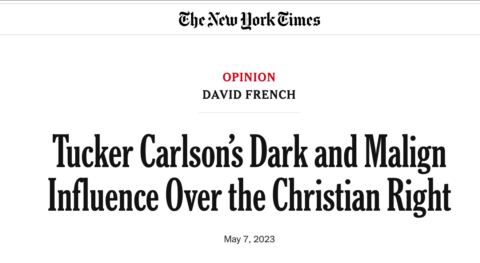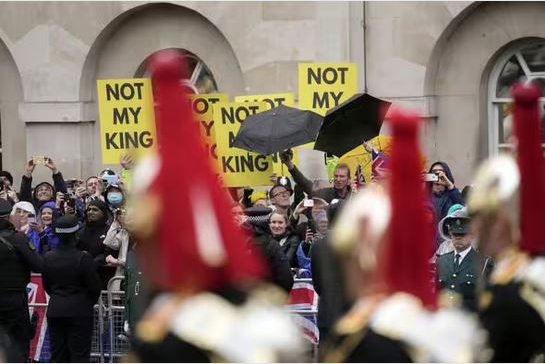The Babylon Bee
Published 3 Feb 2023With The TL;DR Edition of the Bible, you can forget about reading through the Bible in a year — now you can read through the Bible in about five minutes!
(more…)
May 12, 2023
TL;DR Edition Of All 66 Books Of The Bible
QotD: Great (but young) Romantic poets
History being the study of human beings and how they do, you need a baseline grasp of how humans are. It doesn’t matter how smart you are — if you don’t have a good baseline grasp of human nature, History, the discipline, will always elude you.
[This is true of any Humanity, of course. Shelley and Keats have to be in the conversation for “greatest English poet,” right up there with Shakespeare. One or both of them might’ve been more naturally talented than the Bard. But Shakespeare was clearly a man of long, deep experience, whereas the Romantics … weren’t. For every “Ozymandias” or “To a Nightingale”, there’s at least one reminder that these guys died at 29 and 25, respectively. To call “The Masque of Anarchy” sophomoric is an insult to sophomores. “Like lions after slumber, In unvanquishable number.” Ugh. Good God, y’all].
Which is why that “social construction” stuff is so popular. Yeah yeah, it has some real (though really limited) explanatory power, but mostly it’s an excuse for kids who believe themselves clever to avoid contrary evidence. Calling, say, “masculinity” “just a social construction” frees you of the burden of entering the headspace of men who do things as men, because they’re men. To stick with a theme: Shakespeare could’ve written something like “the Masque of Anarchy” — probably as a wicked bit of characterization in Hamlet: The Wittenberg Years — but Shelley never could’ve written MacBeth’s “sound and fury” soliloquy. Shakespeare had obviously seen violent death; Shelley obviously hadn’t.
Knowledge of human nature is almost nonexistent in the Biz.
Severian, “How to Teach History”, Rotten Chestnuts, 2020-12-23.
May 11, 2023
This 100 Year Old Bench Should Have Fallen Apart
Rex Krueger
Published 10 May 2023This old bench changes everything I thought I knew about building furniture.
(more…)
London’s return to normality after Coronation Day
In The Line, Matt Gurney recounts his third and final day in London covering the Coronation, the rather impressive clean-up efforts afterwards and the damp squib of the third day, “The Big Help Out”:
Monday was a holiday in the U.K., too, it’s important to note. A “bank holiday”, in the local jargon, which had been declared as part of the official period of celebration. There were still lots of people working, of course. Restaurant staff and taxi drivers and all the rest. But there were a lot of people who could have been volunteering. And I didn’t see any. Not a one.
I’d gone looking, too. There was a website for the so-called Big Help Out, where you could put in your address and what kind of volunteering you were interested in, and find local opportunities. I used my hotel address and selected every possible category of volunteerism, and was offered … not much. I broadened the search area and … still not much. I could download a few kits to collect some signatures for petitions. I was invited to pick up some trash in my local park, whichever park that was, and just as a solo effort. I was asked to fill out some surveys about nature and wildlife for some local conservation groups. And that all sounds … uhh … worthwhile. But this wasn’t what I had in mind, I admit. No group activities? No community activism?
It seemed odd especially because the entire point of Sunday’s events, the Big Lunches, had been bringing people together. To celebrate. It seemed fitting and appropriate for those same people to then get together the next day and contribute something. But no. No one seemed interested. I didn’t have as much time to wander the city on Monday as I’d had on Sunday, but I still had a few hours, and I didn’t see anything. It was quiet.
This had been foreseen as being a problem. Even before I’d flown over, as part of my research, I’d come across this article in The Guardian, warning three weeks ago that volunteerism was at a crisis point in the U.K., was trending further down, and had been for years. It’s not that anyone seemed to think that the idea of the Big Help Out was bad. It’s just that no one seemed to think many people would actually show up.
Some events certainly seemed to go off as planned. Mainly the ones where royals or other VIPs attended. The BBC reported that the Prince and Princess of Wales, and their children, helped improve a Scouts facility. The prime minister and his wife prepared and served food to the elderly. The BBC also reported that 55,000 events were planned across the U.K. I truly and sincerely hope they did well, and that good things were accomplished in communities and for people that needed the help. But I can only tell you what I saw, as I’ve done in my other dispatches, and I didn’t see anything in London on Monday. I asked around a bit, and people either just shrugged it off and went about their day or hadn’t heard of The Big Help Out at all. They’d sure as hell heard of The Big Lunches, though.
Again, probably not a shock that an invitation to party got a better response than an invite to help out. But still.
He also considers the monarchy as an institution from a Canadian constitutional perspective and I find I largely agree with his conclusions:
If I was starting a country from scratch, I would never decide that the logical thing to do would be to invest our notion of sovereignty and much of our government’s powers in an old man who lives in a castle on an island across the ocean. No one would. It’s absurd. But … it works? And, more to the point, I have zero faith — absolutely zero — that we’d ever be able to replace what we currently have with something that functioned at least as well. That has to be the minimum bar. And look around, at the state of things in Canada right now, and for the foreseeable future. Does anyone think we’re going to be in a place to design a new Canadian republic from scratch without just epically screwing it up? Julie Payette, President of Canada, anyone? David Johnston, Eminent President?
We all know that’s exactly who we’d end up with, right? Would we just skip a lot of fuss and bother and just make the president whomever happens to be the youngest (or oldest, or median) member of the Trudeau Foundation board of directors at any given moment? Alternate between astronauts and retired Supreme Court justices? Tack it on as a side gig for whomever happens to be hosting The National that week?
If you think I’m being unduly flippant or sarcastic, I beg you: imagine the president we’d end up with if we locked Justin Trudeau, Pierre Poilievre and Jagmeet Singh in a room together until they could sort it out. If ever. And then tell me you don’t find yourself reconsidering whatever thoughts you may have re: Charles over in Blighty.
I’m a pretty luke-warm monarchist, to be honest, but the thought of the great and the good of Canada running a republic has me singing “God Save the King” at a high volume. His Majesty King Charles III will almost certainly never achieve the personal popularity of her late Majesty Queen Elizabeth II, and that’s okay. As long as he manages to follow the model of his mother and keep his trap shut about political matters in any of his various realms, the better we’ll all feel about keeping the monarchy going a bit longer.
Bechowiec: Polish Teenager Makes a Resistance SMG
Forgotten Weapons
Published 25 Jan 2023The Bechowiec (or Beha) is a fascinating SMG produced in small numbers in southern Poland under German occupation during World War Two. It was made for use by the Bataliony Chłopskie (Peasant Battalions) by a young man named Henryk Strąpoć.
Henryk built his first (quite illegal) gun at the age of 15 in 1937, and was promptly arrested for it. He avoided prison only on account of being a minor, and promised not to do it again. Well, at least he promised not to get caught again — he built three more guns (two semiauto pistols and a revolver) by the time Germany invaded Poland in 1939. During the occupation he joined the the resistance and set to work doing what he must have fantasized about; building clandestine small arms.
Being more or less familiar with pistols but having never handled a submachine gun, he made some creative design choices. His SMG is basically a scaled-up Ruby-type action — chambered for 9x19mm with a simple blowback slide, it is hammer fired from a closed bolt. He designed a complex but effective selective-fire trigger system, complete with a correct auto sear. The first gun was ready in the spring of 1943, and he had a makeshift production going by early 1944. A total of 11 of the guns were made by July 1944, some in 9mm (using bored-out WW1 Mauser barrels) and some in 7.62x25mm Tokarev (using Mosin Nagant barrels).
Only one example survives today, and it is housed in the Polish Army Museum (and sadly, deactivated). Many thanks to the Museum for giving me access to film it for you! Check them out at: http://www.muzeumwp.pl/?language=EN
(more…)
QotD: Divination
Divination is often casually defined in English as “seeing into the future”, but the root of the word gives a sense of its true meaning: divinare shares the same root as the word “divine” (divinus, meaning “something of, pertaining or belonging to a god”); divination is more rightly the act of channeling the divine. If that gives a glimpse of the future, it is because the gods are thought to see that future more clearly.
But that distinction is crucial, because what you are actually doing in a ritual involving divination is not asking questions about the future, but asking questions of the gods. Divination is not an exercise in seeing, but in hearing – that is, it is a communication, a conversation, with the divine. […]
Many current religions – especially monotheistic ones – tend to view God or the gods as a fundamentally distant, even alien being, decidedly outside of creation. The common metaphor is one where God is like a painter or an architect who creates a painting or a building, but cannot be in or part of that creation; the painter can paint himself, but cannot himself be in the painting and the architect may walk in the building but she cannot be a wall. Indeed, one of the mysteries – in the theological sense […] – of the Christian faith is how exactly a transcendent God made Himself part of creation, because this ought otherwise be inconceivable.
Polytheistic gods do not work this way. They exist within the world, and are typically created with it (as an aside: this is one point where, to get a sense of the religion, one must break with the philosophers; Plato waxes philosophic about his eternal demiurge, an ultimate creator-god, but no one in Greece actually practiced any kind of religion to the demiurge. Fundamentally, the demiurge, like so much fine Greek writing about the gods, was a philosophical construct rather than a religious reality). As we’ll get to next week, this makes the line between humans and gods a lot more fuzzy in really interesting ways. But for now, I want to focus on this basic idea: that the gods exist within creation and consequently can exist within communities of humans.
(Terminology sidenote: we’ve actually approached this distinction before, when we talked about polytheistic gods being immanent, meaning that they were active in shaping creation in a direct, observable way. In contrast, monotheistic God is often portrayed as transcendent, meaning that He sits fundamentally outside of creation, even if He still shapes it. Now, I don’t want to drive down the rabbit hole of the theological implications of these terms for modern faith (though I should note that while transcendence and immanence are typically presented as being opposed qualities, some gods are both transcendent and immanent; the resolution of an apparent contradiction of this sort in a divine act or being like this is what we call a mystery in the religious sense – “this should be impossible, but it becomes possible because of divine action”). But I do want to note the broad contrast between gods that exist within creation and the more common modern conception of a God whose existence supersedes the universe we know.)
Thus, to the polytheistic practitioner, the gods don’t exist outside of creation, or even outside of the community, but as very powerful – and sometimes inscrutable – members of the community. The exact nature of that membership varies culture to culture (for instance, the Roman view of the gods tends towards temperamental but generally benevolent guardians and partners of the state, whereas the Mesopotamian gods seem to have been more the harsh rulers set above human society; that distinction is reflected in the religious structure: in Rome, the final deciding body on religious matters was the Senate, whereas Mesopotamian cities had established, professional priesthoods). But gods do a lot of the things other powerful members of the community do: they own land (and even enslaved persons) within the community, they have homes in the community (this is how temples are typically imagined, as literal homes-away-from-home for the gods, when they’re not chilling in their normal digs), they may take part in civic or political life in their own unique way. […] some of these gods are even more tightly bound to a specific place within the community – a river, stream, hill, field.
And, like any other full member of the community (however “full membership” is defined by a society), the gods expect to be consulted about important decisions.
Bret Devereaux, “Collections: Practical Polytheism, Part III: Polling the Gods”, A Collection of Unmitigated Pedantry, 2019-11-08.
May 10, 2023
From Thomas Szasz to Jordan Neely – how noble ideals can lead to terrible results
At Samizdata, Natalie Solent remembers how her early discovery of Ideology and Insanity by Thomas Szasz helped to shape her philosophical views in a generally libertarian direction. On the other hand, as the death of Jordan Neely shows, one of the long-term results of Szasz’s denunciation of the institutionalization of the mentally ill has been a vast increase in violence, vandalism, and anti-social behaviour in urban areas:
Szasz believed that if we accept that “mental illness” is a euphemism for behaviors that are disapproved of, then the state has no right to force psychiatric “treatment” on these individuals
Great stuff. I think Szasz still has much to teach us… but I suppose by now you have all heard of the killing of Jordan Neely on a New York subway train?
I have linked to the Wikipedia account for convenience, but I do not trust Wikipedia. There are very few media outlets I do trust on subjects like this. The magazine USA Today initially called Neely a “beloved subway performer”. USA Today has changed the article since, but I saw it when it still had the original wording. The article was right to say that Jordan Neely was a human being with a tragic past, but he was not beloved by users of the New York subway. Back in 2013, a Reddit post on /r/nyc warned passengers, “Try to stay away from the Michael Jackson impersonator if you see him … Just avoid the guy at all costs, try not to look at him at all. Stay safe.” That was Neely. By the time of his death, he had been arrested more than forty times, including for crimes of violence.
There are thousands of Americans like Neely who still live as he lived, exercising the right Thomas Szasz helped gain them to be mentally ill (or whatever you want to call it) drug addicts living on the subways and roadside verges of America. It is not going well for them or for others. A viral graph shows the declining proportion of Americans held in mental hospitals and the rising proportion of Americans held in prisons forming a neat “X” over the course of the twentieth century. Liberals in the U.S. sense have a prodigious capacity to not see inconvenient facts, but even they are being forced to notice that the presence of the crazies and junkies is causing their beloved public spaces and public facilities to become dirty, frightening places to which much of the public only goes when it must.
There is a libertarian solution of course: fewer public spaces. This would increase, not decrease, the number of places where the public could happily go. Junkies and crazies are much less of a problem in shopping malls, because the owners still retain some power to eject them. I feel no shame in saying that a further benefit would be that said junkies and crazies would be under more pressure to seek treatment if the state no longer facilitated them sleeping on the sidewalks and the subway trains.
Unfortunately for everyone, this solution is politically impossible in the current climate. Even in the miraculous event that the public transport systems and the streets of New York, San Francisco and Chicago were privatised tomorrow, anti-discrimination law would ensure that practically no one could be excluded.
Thomas Szasz had a noble ideal. Sadly, the way it combined with the dominant ideals of our time has produced very bad results. I know what should and could be done to make things better in a sane society, but the US in 2023 is not that society. So what can be done?
Feasting at a Medieval Tournament
Tasting History with Max Miller
Published 9 May 2023
(more…)
19th blogiversary

19th anniversary celebration badge label in golden color
Image by starline on Freepik
Every year for what seems like a long time, I’ve been quietly mourning the “death of the blog”, which vanished from most peoples’ awareness as just one of the old fashioned things we used to do online before social media ate everything. And yet blogging isn’t really dead, it’s just mostly dead. The good folks at Substack figured out that there were enough good writers — and more importantly, people willing to pay money to read the work of those writers — who didn’t want to put up with bait-and-switch headlines, toxic auto-start video ads, and all the rest of the visual and audio garbage so many “mainstream” sites were extruding.
Unlike the many interesting writers on Substack, I’ve never really used my blog for much in the way of original writing, concentrating more on interesting stuff from others that I wanted to share … I guess that’s what most people started using social media for, until they realized that social media is really intended to hurl insults at those heretics who don’t agree with you 1,000% on every last detail of your political beliefs.
I used to post some rudimentary statistics about blog traffic, but it turned out that the antiquated plug-in I was relying on hadn’t been patched in several years and when it had had enough of gathering stats, it blowed up real good, taking the entire site offline for more than a day before I could get it back online. These days, the WordPress stats indicate a much smaller level of traffic, although the time visitors spend on the blog seems to be getting a bit longer.
Earlier anniversary postings:
- Eighteenth anniversary
- Seventeenth anniversary
- Sixteenth anniversary
- Fifteenth anniversary
- Fourteenth anniversary
- Thirteenth anniversary
- Twelfth anniversary
- Eleventh anniversary
- Tenth anniversary
- Ninth anniversary
- Eighth anniversary
- Seventh anniversary
- Sixth anniversary
Unfortunately, the first five years of postings — when I was merely a freeloading tenant on Jon P’s site … and eventually consuming some 90+% of his paid bandwidth and storage — aren’t accessible any more, at least I haven’t been able to get access for quite some time:
- (Very belated) Fifth anniversary
- (Premature) Fourth anniversary (a few days later, I welcomed my 150,000th visitor)
- Third anniversary
- (Belated) Second anniversary
- First anniversary
How to Make a Wall Shelf | Episode 1
Paul Sellers
Published 13 Jan 2023This was one of Paul’s first teaching and training projects he developed specifically for his hands-on classes for early woodworkers to start on. That was in the early 1990s, so 30 years ago, and many a thousand students have made it to learn about shelf making.
The goal is the mastery of accuracy using sharp tools to develop two types of housing dadoes, the stopped and the stepped.
This video gives the first woodworking joint most woodworkers start with and shows how to get a snug fit every time.
(more…)
QotD: The Deadly Force Paradigm
CAN – do I possess (to a reasonable certainty) the necessary equipment, skills, and mindset to accomplish the task (i.e., WIN)? This element should be addressed objectively, long before the moment-of-decision presents. Common sense in “equipment” selection, and repeated training and practice are essential. Being physically fit is definitely part of this element. Have you done all you can to be truly prepared to respond in a deadly force encounter? By the way, which is paramount — equipment, skill, or mindset? Always?
MAY – is the use of deadly force within the law (and in policy for the sworn acting in official capacity and/or within the scope of employment)? This element is also addressed objectively, long before the moment-of-decision presents. There are good books and lectures around for general information, and some for state specific analysis. The latter is very, very important. The legal concepts are not always the same for the LEO and non-sworn. When deadly force is used other than in defense of self, the legal issues become more complicated. Have you considered the legal and moral imperatives for having less-lethal equipment and skills? What about advance decision-making for the “aftermath”?
SHOULD – are the “rewards” significantly greater than the “risks”? Everything you are/have and ever will be/have are at stake. This element introduces subjectivity. Many firearms and “personal defense” trainers include this topic (one way or another) in their preset curriculum or address it by responding to questions and hypothetical scenarios. That’s fine, but their analysis cannot definitively answer much for you — you must have thought about and through “it” in advance. I stray away from providing others guidance on the SHOULD, other than to, in somewhat knee-jerk fashion, say sheepishly, “mind your own business”. But, I will note I am not the arbiter of what “your business” is, you are. Except, when something else is in play … or maybe not. Bottom line: It is your gunfight, your life, your future, etc., not the trainer’s. No matter how you stack up on the CAN, success in a deadly force encounter often includes some luck. A well-executed spin of the wheel can still produce varied results. Maybe it’s just a “crap shoot?”
MUST – will you or someone you cannot live without die or suffer great bodily injury unless deadly force is applied? This element calls for application of objective and subjective reasoning, grounded in your knowledge bases of the CAN and MAY. You will be second guessed … by those who were not present and have not had a similar experience. Does that really matter? Pardon me for asking, but do you know what constitutes great bodily harm and what “weapons” can cause it? The applicable legal definition of deadly force?
What about the interrelationship of the elements? Something well north of most of the time, a green light on the CAN and MAY doesn’t compel a green on the SHOULD. (Never lose perspective, especially just because there is a stand your ground law applicable). Similarly, a green on the MAY and SHOULD doesn’t mean the MUST is invoked. There are alternatives to the use of deadly force: Avoidance, disengagement, de-escalation, non-deadly force. Does it “go without saying” that noble intention, green lights on the MAY and SHOULD, and application of the MUST, may not matter a whit if you don’t possess the CAN?
Steven Harris, “The Deadly Force Paradigm Revisited: Can – May – Should – Must”, Modern Service Weapons, 2015-04-28.
May 9, 2023
How to destroy an industry with one simple trick
Ted Gioia on the precipitous rise and calamitous decline of the clickbait journalism model:
I was going to call this story the “tragedy of American journalism”. But when you dig into the details, it’s more a farce.
Let’s start with act one of this comedy. I could almost begin anywhere, but I picked an especially ridiculous case study — just wait until you learn the reason why.
Did that catch your attention?
It was supposed to. And I learned that from a now (mostly) forgotten website called Upworthy.
Almost exactly 10 years ago, Upworthy was “the fastest growing media site of all time”, according to Fast Company. They had turned news into a science. Upworthy was the future of journalism.
“Upworthy is known for its use of data to drive growth, testing up to 16 different headlines for a single story,” enthused that bright-eyed reporter for Fast Company. The end result was headlines so irresistible, millions of people clicked on them.
Here are some examples:
- A Gorgeous Waitress Gets Harassed By Some Jerk. Watch What Happens Next.
- A Teacher Ran to a Classroom to Break Up a Fight, but What She Found Was the Complete Opposite.
- It’s Twice The Size Of Alaska And Might Hold The Cure For Cancer. So Why Are We Destroying It?
- If You Could Press A Button And Murder Every Mosquito, Would You? Because That’s Kinda Possible.
You get the idea. The headline is in two parts — and it’s just a come-on. You have no idea what the article is about until you click on the link.
That was the whole point. But just wait until you learn the problem with this.
Facebook and other social media sites eventually discovered that people clicked on these links, but didn’t spent much time with the Upworthy articles — and rarely gave them likes and shares.
The stories just weren’t very good — and certainly not as interesting as the headlines. So the algorithms started to punish clickbait articles of this sort.
The Upworthy empire collapsed as quickly as it had risen.
In retrospect, the problem with this gimmicky strategy is obvious. If you trick people into clicking on garbage, your metrics are impressive for a few months. But eventually people can smell the garbage without even clicking on it.
There’s also a deeper reason for this collapse — which I’ll get to in a moment. And it helps us understand the current problems with journalism. But first we need to look at a couple more case studies.
The Republicans’ moment in the sun rain
I joked on Coronation Day that the only people not trying to have a good experience there were the British republicans, but they did get a bit more attention due to their proximity to the Royal Procession than they normally manage:
I mentioned before that it was a happy crowd, with high spirits. The crowd didn’t strike me as remarkable, which is to say, there wasn’t anything particularly notable about it. It was mixed. You’d find every age group and colour there, as well as a smattering of obvious tourists. Lots of people had little Union Jacks they would wave or tuck into the brims of hats or under backpack straps. Some wore full-sized flags as capes. A few young men, who’d obviously been drinking either since early that morning or perhaps the night before, were there in cheap royalty costumes — robes and plastic crowns. The way they were going, I had doubts they’d last much longer. One in particular seemed a bit wobbly on his feet.
One young woman with them had somehow attached a frisbee to her head, in delightfully mockery of the absurd hats women seem to love wearing to royal events. It made me laugh. So begins and ends The Line‘s coronation-related hat commentary.
One of a collection of photos from Kim du Toit’s post-coronation post showing many (perhaps most) of the Republican protestors along the parade route.
https://www.kimdutoit.com/2023/05/08/monday-funnies-post-coronation-edition/Quite near to the front of the viewing area, just off to the left of Nelson’s Column, was a group of a few dozen republican protesters. I have to remind my North American readers — I don’t mean U.S. Republicans, the of-late MAGA-infused husk of the once Grand Old Party. These are British republicans, an arguably even more baffling breed: these are the people that want Britain to be a republic. They too were a mixed group, but as I wandered over to join them, I did note something interesting. I had expected them to be younger and more ethnically diverse than the rest of the crowd. They weren’t. I don’t know if I’d go as far as saying that they were less diverse, but my sense was that, at least in terms of the age of the crowd of protesters, maybe they were a touch older than the rest? In any case, it would have been a near-run thing, but that was one of the only things that really jumped out at me about the protest. My assumption that they’d be younger, more diverse, more obviously progressive was wrong. If they’d dropped their yellow flags and banners and quit their chanting of “NOT MY KING!”, they’d have blended in with the rest.
It started to rain around this time. It’s England, of course it was raining. I’d come prepared with a rain jacket so wasn’t deterred, but the rain did have one admittedly lousy impact. Umbrellas. I’d been gradually able to work my way up quite close to the front of the crowd — I’d stuck close to the republicans and it seems that many people tried to give them a wide berth, and I’d been able to shuffle my way gradually forward. Nelson’s Column was to the right, behind me. To my right and front was Admiralty Arch. And off in the distance, but not too far, was Westminster Abbey itself. It was a pretty perfect place to view the procession.
But for the umbrellas. Once they opened up, all one could see was umbrellas.
And that’s how it stayed, to be honest. Troops began to march past in perfect ranks. Bands struck up patriotic songs. The crowd cheered and more than a few sang. One loud female voice — a surprisingly lovely one — struck up The Star Spangled Banner — which was either some kind of deliberate prank or just a very historically confused soul getting caught up in the moment. I heard the clopping of hooves and the crowd went absolutely wild, and suddenly, thousands of arms shot up into the air holding smartphones, every person present seeking a better angle for their videos. The arms and the umbrellas made it virtually impossible to see a damn thing. (See this video by a New York Times team: they must have been standing within 50 feet of where I was, a bit off to my left. You’ll see what I mean.)
That was from Matt Gurney’s sleep-deprived view of the procession from The Line (that’s not editorializing on my part — he hadn’t slept on the plane from Toronto and got to London at 7am on Coronation Day). In what seemed like a useful break in the public celebrations, he snuck away to get some sustenance and be out of the rain for a bit. When he returned it was lowlight time for the Republicans:
After I’d polished off the pint, I headed back out, back to the square, and that’s where things got interesting. I figured I’d get back to my former spot near the chanting republicans, and did so, no problem. But I noticed there suddenly seemed to be an awful lot of cops around … all heading that way. As in: right toward me, and the chanting people I was standing near. Oops. I left, working my way around the crowd, heading back the way I came from my hotel, and found myself actually facing a rank of advancing cops. Oops again. One had a badge that said inspector, and I walked right up and told him I was a Canadian journalist just watching things. He grinned at me and said, “Alright, mate, come this way,” and had a security guard walk me through the police. I thus ended up missing what has proven to be a controversial event and perhaps the only unhappy moment I know of during the coronation, at least in my area: a bunch of the chanting republicans were arrested just moments after I got out of dodge, and then large metal screen barriers were thrown up, closing off the square due to, apparently, overcrowding. People could leave but no one new could enter.
My sense, as I walked away, was that there was no reason to arrest anyone. (And as I said, this is proving controversial.) I hadn’t seen anything getting out of hand. There had been some chanting and counter-chanting and even some heckling back and forth, but it had all seemed in good enough spirits. Even some of the boos sent at the republicans — two young men with flags had been hamming it up in the main crowd, apart from the main blob of republicans — had seemed in good humour. I don’t know what the police saw or knew. But I couldn’t tell you why they’d moved then and not before, or later. As for overcrowding, I don’t think so. The square really wasn’t all that full. It seemed less full at that moment than it had been when the procession had passed on the way to the abbey. But the barriers seemed to go up quickly, everywhere. Literally everywhere.
And though I was glad to have avoided getting caught up in the Cops vs. Chanting Republicans, I was now on the wrong side of the barriers.
In The Critic, Kittie Helmick recounts finding herself in the vicinity of the “NOT MY KING!” group:
“You seem to find this whole thing rather amusing,” snapped a short angry man with a Not My King sign, about half an hour into the Republic protest against the coronation of King Charles III. I must admit I did. Kettled into a small enclave just off Trafalgar Square, an angry swell of old school socialists, Twitter anarchists, Lib Dem mums, eccentric vicars, boomer hippies, blue haired students and Covid conspiracists had somehow found themselves part of the coronation spectacle. Before the bells of St Martin in the Fields, the full shouty brunt of British republicanism was aimed at a bewildered stream of Chinese tourists and young families out for a day in London.
The survival of the British monarchy is one of the great wonders of modern history. Spending the morning of the coronation with Republic, it began to seem less mysterious. Despite everything in recent years, the Monarchy is still liked more than most of our institutions and probably every one of our elected politicians. No one gathered there could really explain why. The arguments were articulated in between the shouty chanting: things about “modern Democracy” and a “family of Lizards”, none of which quite landed the blow as the day unfolded around us.
Somewhere beyond the crowds, towards Westminster Abbey, an ageing, eccentric dandyish farmer, who secretly wants to be King of Transylvania, was being anointed in holy oil and crowned by an Archbishop wearing hearing aids in a seven hundred year old chair vandalised by 18th century schoolboys. All the while this ceremony was being fawned over across the world by everyone from Kay Burley to one of the world’s most remote tribes. None of it made sense, and that is precisely the point.
Earlier that morning, the CEO of Republic Graham Smith, a man not even the protestors could name, achieved the greatest success of his kind since Cromwell, by being arrested at the hands of the jobsworth Met. For a brief moment, a shiver of excitement spread through the protest. Whilst the country was entranced by a fugue of sombre ritual and Zadok the Priest, Republic were experiencing their own desired reality unfold on the streets of London. Here was a police state enforcing the will of a “politically illiterate” nation brainwashed by bunting and tabloid journalism. The mask was finally off. The incoherent gaggle of shouty slogans and reddit thread arguments made sense. The fight was here and now.
Except that was all a fantasy too. As stupid as the arrests were, nothing could disguise the fact this was a fringe event for a movement that just can’t seem to take off — a Coronation curio to gawp at. “They’re a bunch of wronguns, aren’t they?” said one bored steward to me as we watched a man larping Les Miserables as he chanted Not My King at a trio of giggling Chinese students. The deeper I dug into the many arguments and protestations offered as an alternative to the “fairytale” of monarchy, the more the core transgressive energy of British republicanism revealed itself. It is itself strangely twee and fantastical. Rid us of the Royals, and everything will become better. Gone will be the “psychological baggage” of Britain’s past holding us back. Democracy will triumph. The crown jewels will be sold off and spent on food banks. The plebs will not worship hereditary blood, but NHS rainbows. Britain will become less racist, elitist and classist. The left might even win an election. We could have a poet president like Ireland, a Lineker or a Stormzy shaking hands with the American president.
Apparently, we are all misunderstanding the Trudeau masterplan
All the smoke about Canada not having a national identity is there to hide Justin Trudeau continuing his father’s masterplan to DESTROY QUEBEC:
“Quebec caught in a trap. French forced into decline. Its political influence doomed. 12 million residents in Montreal. Quebec with 5 million. Ottawa’s grand plan explained. Justin is smarter than we think. They want to assimilate us all. All this, without any debate. Two catastrophic scenarios.”
Forget King Charles III’s coronation or the Liberal Party Convention. If you woke up Saturday morning in Quebec, this was the apocalyptic front page that graced your browser, courtesy of the Journal de Montreal:
The Journal‘s cri-de-coeur was in response to the federal government’s increase in the annual immigration level to 500,000 people. This increase, designed to boost the population of Canada to 100 million by the end of the century, would marginalize Quebec’s influence within Canada. It is estimated that Quebec’s overall share of the Canadian population would fall from 25 to 10%, while francophone Quebecers would be in the minority within their own province for the first time in 500 years.
This would displace Quebec from the center of power in Canada. Its official language, French, would be relegated to the same status as all languages and cultures other than English. Instead of being one of Canada’s two official languages, French would merely be one of many, and Quebec, no longer a nation, but a province like any other.
But wait: Journal authors further suggest that this was the grand plan of Prime Ministers Justin and Pierre Elliott Trudeau all along. In a very colorful column, “How the Trudeaus Drowned Quebec“, columnist Richard Martineau even compares the current PM to the protagonist of an infamous Stephen King novel:
“For Justin, Canada is not a country.
It is a hotel, an Airbnb.
And Quebec is just one of the many rooms in this vast real estate complex.
Room 237, here. Like the one in the movie The Shining.
Come, drop your bags and settle in! All we ask is that you pay your taxes.It’s true that Trudeau Sr. paved the way for the reduction of Quebec’s power in Canada, but it didn’t start with his 1981 Charter of Rights, as the Journal claims. It actually began a decade earlier, in 1971, with the creation of Canada’s Official Multiculturalism Policy. The policy enshrined the idea that linguistic and cultural minorities in Canada should be encouraged to preserve their heritage, and allocated federal funding to help them do so.
Official multiculturalism was both a vote-getter for the Liberals and a means of diffusing the English-French “two solitudes” paradigm that was threatening to tear the country apart. At the time, Canada had just lived through the October Crisis of 1970, which had seen Trudeau invoke the War Measures Act in response to terrorist acts by the Front de Liberation du Quebec. Official multiculturalism was seen as a way to boost the federalist cause by aligning the interest of linguistic and cultural minorities within Quebec with those of the federal government.
The larger impact, however, was to enshrine multiculturalism outside Quebec, where most minorities settled, and where garnering favour with different cultural communities became standard operating procedure, particularly for the federal Liberal party. Immigration thus became a politically untouchable issue, except in Quebec, where the protection of the French language continued to take precedence over concerns for minority rights.









